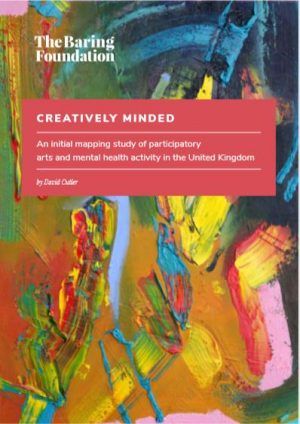On 15 May, just eight weeks into the lockdown imposed to contain the spread of Covid-19, the Royal College of Psychiatrists warned of a ‘tsunami’ of mental illness to come. A survey of more than 1,300 doctors reported a 43% rise in urgent referrals and a similar fall in attendance at routine appointments. The College’s concern was that fear of coronavirus was keeping patients away from the vital services providing regular support, with a consequential increase in crises and emergency admissions. They also report evidence of the lockdown’s effects on people with no previous experience of mental health problems.
The arts have long played a vital part in helping people respond to mental ill-health. Mostly, it is in the everyday activities and services that enable people to manage their own conditions and live relatively well in the community. The Baring Foundation’s recent publication, Creatively Minded, describes the work of 170 mostly small organisations who use the arts to support people with mental health problems. The heart of their work is participatory art, giving people opportunities to create, perform and simply play, in kind and supportive spaces. Like most social and economic life all these arts activities came to a brutal halt when lockdown was imposed and there is, as yet, no indication of when they might be able to resume. They face two existential problems.
First, the social distancing rules, which seem likely to remain in place for some time to come, make much of this work impossible. Dance and theatre depend on physical contact: it’s not impossible to create socially distanced performances but their attraction is small and the stories they could tell might not be those we need right now. But the problem is much broader than performance. Much of the value people derive from participating in art activities is in social contact. Simply being in a safe space with other people, perhaps for the only time in the week, is a huge benefit for people experiencing anxiety, depression and similar long-term illness. The measures that could make workshops safe again might also contribute to an increase in anxiety and fear of infection, thus undermining the value of attending. This is a Catch-22 situation. People who most need the quiet, regular support that arts projects offer are also those who may find the new rules under which those activities can happen off-putting or even frightening. The artists who do this work are exceptionally committed and creative: they will find ways to work with people – indeed many, such as Outside Edge Theatre, have already done so in lockdown, online and by phone – but it will take time and it will not be easy.
That is where the second threat comes in. The arts and cultural sector is among those that have been hit hardest by the lockdown. Theatres, concert halls and galleries remain closed and the government is unable to say when they might reopen. Since most earn a very high proportion of their income – it is 70% for Tate and the National Theatre – the longer they are closed, the more precarious their position becomes. Large and famous arts institutions have been asking government for help: some are already bankrupt, while others are making their staff redundant. This week, the DCMS announced a £1.57 billion fund to protect ‘Britain’s museums, galleries, theatres, independent cinemas, heritage sites and music venues’. This has been welcomed with relief and gratitude by the cultural sector, but – and bearing in mind that the detail is still to come – the funding is clearly for institutions, businesses and buildings. It is unclear how far, even if, these resources will reach the lower reaches of the food chain, where arts and mental health work happens, but for the vulnerable organisations and freelance artists who do the work, the present situation is bleak. It is for that reason that the Baring Foundation has launched a £900,000 fund to give unrestricted grants to as many organisations in this sector that it can help. We know the importance of their work, the fragility of their position, and the huge need there is for the support they provide.
When the Royal College of Psychiatrists uses a word like ‘tsunami’ to characterise the scale of mental health need, some may feel it is tipping into hyperbole. I trust their judgement, because I know how many people have been cut off from the regular support they received through arts and mental health projects. I know too that, neglected as this arts and health interface is, there are far more who could benefit from such programmes but have no access to them. The lockdown has been a heavy blow in terms of mental health. Now many people will have to cope with unemployment, financial problems, grief and fear of illness, with consequences that are not hard to imagine. Arts and health projects cannot put all that right, but they are vital in helping people cope and recover. It is high time that was recognised and that they were empowered to do the vital work that is now so needed.
François Matarasso is a trustee of the Baring Foundation.
We have also published a series of blogs by arts and mental health organisations during the COVID-19 lockdown to explore some of the challenges of participatory work remotely.
